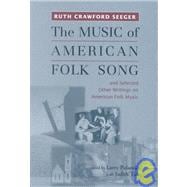
Note: Supplemental materials are not guaranteed with Rental or Used book purchases.
Purchase Benefits
What is included with this book?
| List of Illustrations | p. ix |
| List of Music Examples | p. xi |
| Foreword | p. xv |
| Foreword: A Few Personal Words about Ruth Crawford Seeger's The Music of American Folk Song | p. xvi |
| Foreword | p. xix |
| Historical Introduction: The Salvation of Writing Things Down | p. xxi |
| Editor's Introduction | p. xxxi |
| Abbreviations | p. liii |
| The Music of American Folk Song | |
| A Note on Transcription | p. 7 |
| The singer and the song | p. 7 |
| Phonographic recording of the song | p. 8 |
| Transcription of the song from phonographic recording | p. 8 |
| Transcription from phonograph recording versus dictation direct from folk singer, player or intermediary | p. 8 |
| Transcription through graph notation | p. 9 |
| The reader and the song | p. 11 |
| Music notation as a bridge | p. 13 |
| Three basic types of transcription illustrated | p. 14 |
| Song-norm | p. 22 |
| Majority usage | p. 23 |
| Underlimits of amount of detail shown in notation, especially with regard to the simpler singing-styles | p. 25 |
| The model tune as representative of the song as a whole | p. 26 |
| The initial tune as model tune | p. 27 |
| The composite tune | p. 28 |
| The transcriber and a changing oral tradition | p. 28 |
| Notes on the Songs and on Manners of Singing | p. 31 |
| Adherence to a dynamic level throughout the song as a whole | p. 31 |
| Adherence to a dramatic level throughout the song as a whole | p. 32 |
| Adherence to the tempo set at the beginning of the song | p. 33 |
| Infrequency of long ritardandos from the beginning to the end of the song as a whole | p. 33 |
| Infrequency of short stereotyped ritardandos at ends of phrases and stanzas | p. 33 |
| Strict time and free singing styles | p. 34 |
| Pulse and count | p. 36 |
| Anticipation and delay of beat | p. 38 |
| Simple and compound meter | p. 41 |
| Metrical irregularities--prolongation and contraction of measure | p. 54 |
| Prolongation of measure--the extended tone and the extended or inserted rest | p. 57 |
| Underlimit of metrical irregularity shown in these notations, especially with regard to extension of tone and extension or insertion of rest | p. 58 |
| Manners of notating extended tone and extended or inserted rest | p. 59 |
| Metrical irregularities--divisions of beat and measure | p. 61 |
| Rest | p. 62 |
| Phrase pattern | p. 63 |
| Number of measures to a phrase | p. 63 |
| Number of phrases to the [stanza] | p. 64 |
| Interstanzaic variation | p. 64 |
| Manners of accomodating extra syllables of succeeding stanzas | p. 66 |
| Tone attack and release | p. 66 |
| Attack | p. 66 |
| Release | p. 67 |
| Intonation | p. 67 |
| Scale and mode | p. 69 |
| Accompaniment | p. 72 |
| Editor's Endnotes | p. 77 |
| Songs Referred to in The Music of American Folk Song | p. 108 |
| List of Unpublished Transcriptions in the Lomax Family Archives | p. 114 |
| Amazing Grace/Pisgah Transcriptions, from George Pullen Jackson, White and Negro Spirituals | p. 118 |
| Selected Other Writings on American Folk Music | |
| Editor's Introduction | p. 129 |
| Pre-School Children and American Folk Music (late 1940s?) | p. 131 |
| Keep the Song Going! (1951) | p. 137 |
| Review of John N. Work, American Negro Songs for Mixed Voices (1948) | p. 144 |
| Index of Songs | p. 147 |
| Index | p. 153 |
| Table of Contents provided by Syndetics. All Rights Reserved. |
The New copy of this book will include any supplemental materials advertised. Please check the title of the book to determine if it should include any access cards, study guides, lab manuals, CDs, etc.
The Used, Rental and eBook copies of this book are not guaranteed to include any supplemental materials. Typically, only the book itself is included. This is true even if the title states it includes any access cards, study guides, lab manuals, CDs, etc.